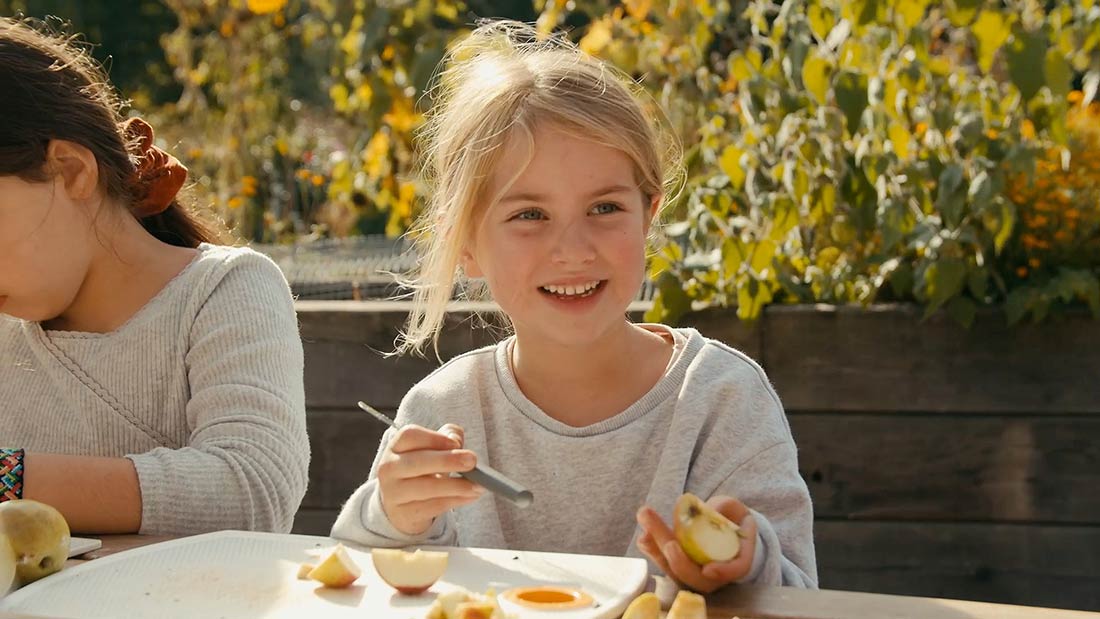
Client: German Commission for UNESCO
3 × 5 min, 1 × 3 min | 2022-23 | 16:9 | HD
The "National Award – Education for Sustainable Development" is not only endowed with prize money, but is also intended to help the award winners achieve greater visibility. On behalf of the Federal Ministry of Education and Research (BMBF) and the German Commission for UNESCO (DUK), we produced a multi-part film series about the winners.
The ten award winners differed in terms of initiative and content. As a film agency, we were asked to highlight and visualise this. Our approach was to present the award winners within the four resulting films in a uniform form and with a serial character. We presented the various initiatives and projects in each category on an equal footing, giving them their own individual space. The serial character ensures a consistent uniformity in all four films.
EPISODE 1/4 | NATIONAL AWARD – ESD: CATEGORY EDUCATIONAL LANDSCAPES 2022

EPISODE 2/4 | NATIONAL AWARD – ESD: CATEGORY PLACES OF LEARNING 2022

EPISODE 3/4 | NATIONAL AWARD – ESD: MULTIPLIERS 2022

EPISODE 4/4 | NATIONAL AWARD – ESD: NEWCOMER 2022

The films are intended to show the initiatives in such a way that they awaken the desire and courage to commit to sustainability. We want the films to encourage viewers to follow suit and appeal to a broad section of society of all ages. This requires good ideas and a portion of enthusiasm in order to achieve a step forward. We achieve this in the films with a positive and approachable narrative style, embedded in a modern, contemporary guise. We accompany the actors in a documentary style and show the initiatives as they are and act. To emphasise the serial character, we have added graphic elements to the films. These elements are the same in all films, but differ in the respective colour of the competition category. They are realised on the basis of the existing visual appearance.
The challenge in preparation was to bring the ten initiatives together at different locations in Germany within two filming blocks that were as coherent as possible. In addition, suitable projects and protagonists of the initiatives were to be selected in advance together with the winners to present the respective initiative in the films. Seven days were planned for the filming. Care was also taken to ensure that the route through Germany was as efficient and resource-friendly as possible. The film was shot within a month with a three-person team consisting of a director, cameraman and camera assistant. Each initiative had half a day of filming available, as there was usually another initiative to be filmed on the same day or the next location to be travelled to. The filming locations were Münster, Hamburg, Bremerhaven, Oldenburg, Karlsruhe, Limburg, Wandlitz and Groß-Pankow (Prignitz). A professional 4K film camera and energy-saving LED lighting technology were used for the shoot. A drone also provided aerial perspectives, giving viewers in the films an overview of the scenery on location.

During the extensive editing process, the films were reviewed via our feedback platform and efficiently evaluated by all those involved from UNESCO and the BMBF. The colour grading of all films, in which the design of the film with colours and contrasts is defined, took place with our colourist Marcus in a professional colour grading studio. External film material was also optically adapted to the newly shot images here. At the sound level, the interviews alternate with the music used. Our sound engineer Alex created an atmospheric sound design for the four films with natural soundscapes of nature and interiors.
As defined at the beginning of the briefing, we also paid particular attention to consistency and authenticity during the post-production process of the film images and the film sound.
